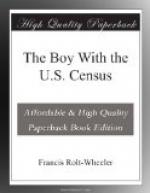“Wa’al, thar was the McCoy-Hatfield feud in Pike County, that started over the ownership o’ two plain razorback hogs, but afterwards got very bitter, owin’ to the friendship o’ one o’ the McCoy girls with the son o’ Bad Anse Hatfield. Then thar was the Howard-Turner feud in Harlan County. An’ then—”
“What started the Howard-Turner feud?” interrupted the boy.
“That was over a game o’ cards. One o’ the Howards had been winnin’, an’ Jim Turner, with a pistol, forced him to give back the money he had won. That affair raged a long time. The Logan-Tolliver feud in Rowan County was over an election fo’ sheriff. The Logans elected their candidate, an’ so the Tollivers killed one o’ the Logans at the polls and wounded three others.”
“That’s expressing dissatisfaction with an election with some spirit,” Hamilton remarked.
“Then thar was the French-Eversole feud in Perry County,” continued the Kentuckian, reminiscently. “Ol’ Joe Eversole was a merchant in a town called Hazard, an’ he helped Fulton French to start a little store. In time French almos’ drove Eversole out o’ business. That was a strange fight, because neither French nor Eversole ever got into the shootin’,—indeed they remained frien’ly even when their supporters were most bitter.”
“Who carried on the feud, then?” asked Hamilton in surprise, “if the principals didn’t?”
“Wa’al, I guess the worst was a minister, the Rev. Bill Gambrill. Ho ran the French side an’ kep’ the trouble stirred up all the time.”
“I think I’ve heard of the Turner war, too,” said the boy. “Was that the same as the Howard-Turner fighting?”
“All of them were mixed up in each other’s feuds in that Turner family,” the Kentuckian replied, “but the ‘Turner War’ or the ‘Hell’s Half-Acre’ feud was in Bell County, an’ it started over some question o’ water rights in Yellow Creek. It was a sayin’ down in Bell County that it couldn’t rain often enough to keep Hell’s Half-Acre free from stains o’ blood.”
“It is a fearful record, Uncle Eli, when you put them together that way,” the boy said.
“An’ I haven’t even mentioned the worst o’ them, the Hargis-Cockrill feud in Breathitt County. That lasted for generations, an’ started over some election for a county judge. I don’ know that any one rightly remembers the time when Breathitt County wasn’t the scene of some such goin’s on.”
“But they are all over now, aren’t they?”
“I was jes’ goin’ to tell yo’. They’re all over but one, an’ that one is sometimes called the Baker-Howard or the Garrard-White feud, for all four families were mixed up in it. Not so very long ago I was talkin’ to the widow o’ one o’ the men slain in that fightin’, an’ sayin’ to her how good it was that the feelin’ had all died out, an’ she said—thar was a lot of us thar at the time—’I have twelve sons. Each day I tell them who shot their father. I’m not goin’ to die till one o’ them shoots him.’ I’m reckonin’ to hear o’ trouble in Clay County mos’ any time, but I really think that is the last o’ them.”




